How Do You Reheat Beef Tenderloin
Beef tenderloin is the most tender cut of beef and a perfect way to celebrate a special occasion. It's very lean, flavorful, and so soft, it practically melts in your mouth. Beef tenderloin is easy to roast in the oven with simple seasoning of fresh garlic, salt, and pepper.
Don't miss even more delicious beef recipes like this perfect Prime Rib, Roast Beef, and Pepper Crusted Beef Tenderloin.
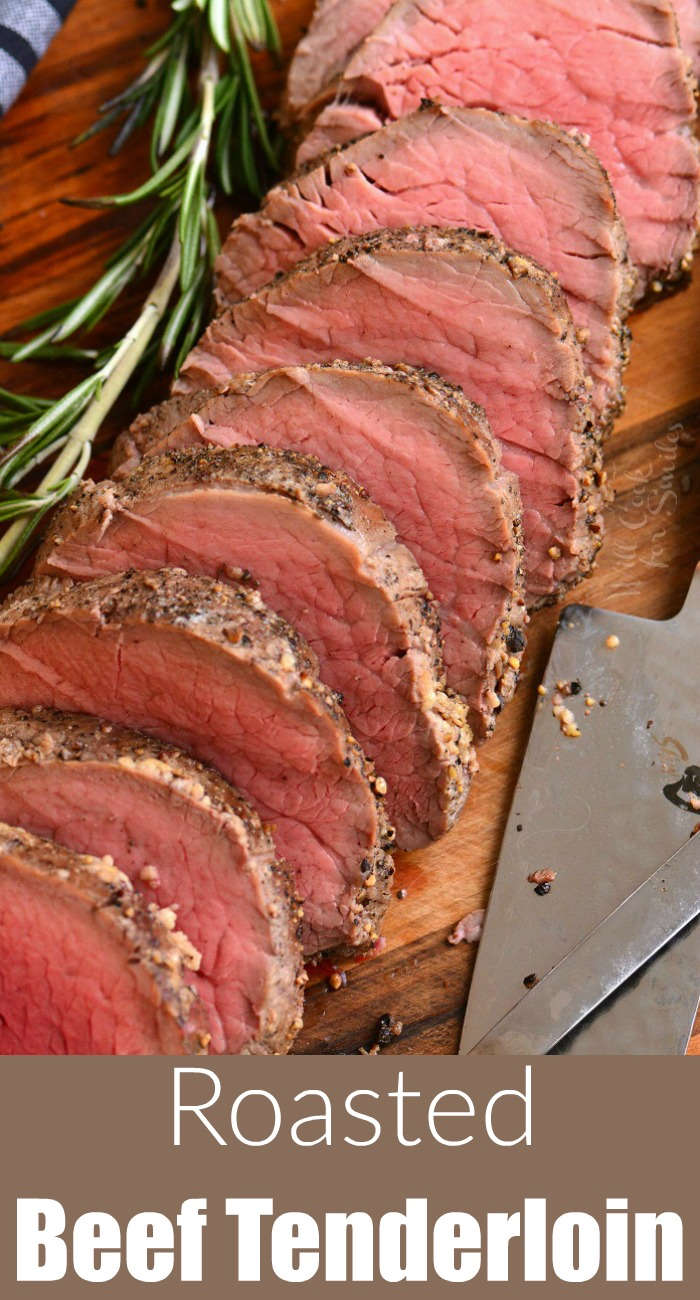
BEEF TENDERLOIN
If you never bit into a piece of beef tenderloin, you should try it immediately. Your life will be changed forever with the first bite of this soft, tender piece of beef. Tenderloin is the most tender cut of beef, it practically melts in your mouth. Because it is the most tender meat, it is priced accordingly and can be quite expensive. That is why we call it the "special occasion" meat.
Tenderloin is a long, thin muscle that runs deep inside, along the back side. It's located right under the spine. This muscle is not weight bearing, doesn't get worked out much, and doesn't have much connective tissue, which is what makes it so tender. Beef tenderloin is a source of highly desired steak cuts such as a Filet Mignon, Tenderloin Steak, Chateaubriand, and tournedos.
When it comes to cooking the whole beef tenderloin, you have a couple of different options. You can cook the whole tenderloin top to end, or you can cook the middle potion of the tenderloin called Chateaubriand. A whole tenderloin can range from 5 to 8 lbs and can feed 6 to 12 people, depending on slices cut and sides served with it.
If I am making a beef tenderloin for an intimate celebration of 2 to 6 people, I usually choose to make the center cut. A whole tenderloin is better for a larger dinner that feeds more than 6 people. Although, beef tenderloin can be reheated without loosing its tenderness or temperature that it was cooked to. (I share my reheating secret a little later in this article.)
PIN THIS RECIPE
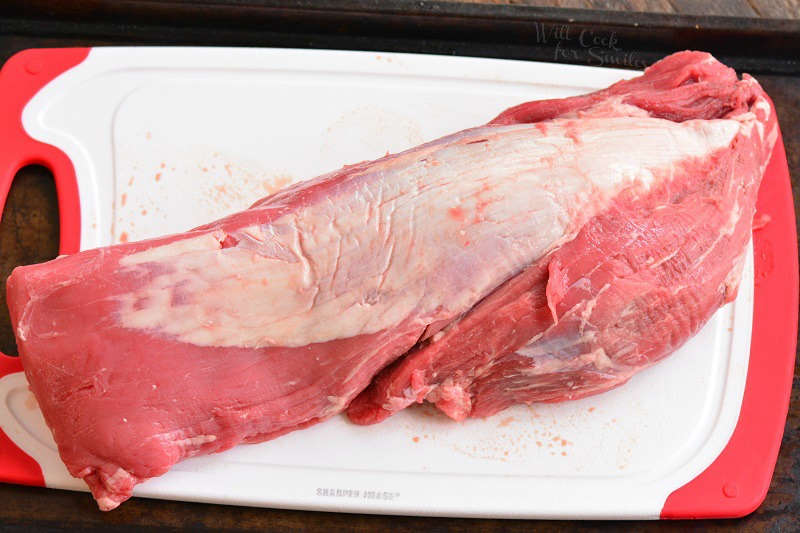
HOW MUCH BEEF TENDERLOIN PER PERSON
The rule tends to be a little different when it comes to beef tenderloin. Normally, when it comes to main meats, you should estimate 1/2 lb (or 8 oz.) per person but, beef tenderloin is a very expensive cut of meat. It's okay to estimate a little smaller portions, so you can go down to 4-6 oz of trimmed beef tenderloin per person.
CLEANING BEEF TENDERLOIN
Even though beef tenderloin is a very lean muscle, it does still require some cleaning. There is some excess fat that is better to take off but try not to cut off every tiny piece of fat, but the excessive one on the side. It's also important to remove the silver skin.
NOTE: Most grocery stores with a butcher department can help you clean the tenderloin if you are not willing to do it yourself. You can also request a butcher to cut the tenderloin to a more desired size if needed.
If you have to clean the tenderloin yourself, don't be scared. All you need is a sharp knife, a cutting board, and a larger rimmed baking sheet to fit the cutting board. I use a baking sheet under my cutting board because even the rimmed cutting board still drips blood everywhere. Placing the cutting board inside the baking sheet while butchering the meat makes for a much easier clean up layer. (Use a new clean cutting board and rimmed baking sheet to cut cooked beef.)
Take the tenderloin out of the package and take a look: the butt end is the thickest end of the tenderloin and it also has a "wing" piece attached to it. The center cut is the middle part of the tenderloin. It is the most uniform is size and where filet mignon comes from and chateaubriand. The tip end, is the small, thin end of the tenderloin that is also the piece used for tournedos steaks.
Remove the chain if needed:
Although most packaged tenderloin will come without the chain, some tenderloin may still have it attached. It looks like a thin, fatty piece of meat running down the length of the entire tenderloin.
It will be quite easy to spot and very easy to remove. You can actually remove it with your hands and may just been a few assist cuts along the way. Just follow it along, separating it from the tenderloin.
DO NOT discard the chain. It is not a part of tenderloin but it is still good meat and will be great used in a soup or stew.
Remove the silverskin:
Silverskin is a tough layer of white, shimmery connective tissue that runs along the tenderloin. It MUST be removed. To remove it, pull up some of the silver skin at one end of the tenderloin and then use a thin knife to cut along the silver skin to separate it from the meat.
Some silverskin will pull up just by tugging and pulling with your hands. use a knife to remove remaining pieces of silverskin but try not to remove any of the actual meat.
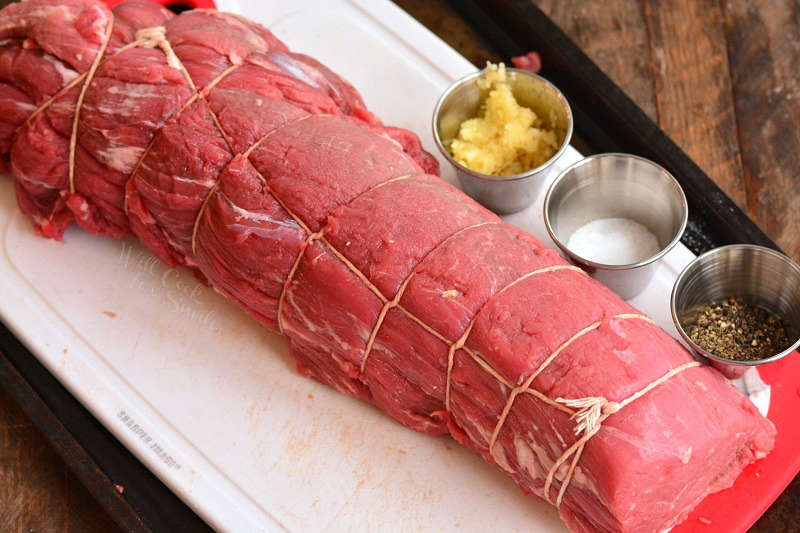
Tie Beef Tenderloin:
Yes, it is important to tie it but no, it is not important to use the professional looking butcher tying technique.
To make the tenderloin more even at the thin end, cut the tip where it starts to get narrow almost all the way off but not completely off. Tuck the narrow, thin tip under the tenderloin. Use cooking twine to tie the tenderloin all along the whole length in 1-inch intervals. Make sure not to tie too tight where it starts cutting into meat.
TIP: always tie the meat before adding seasoning so the seasoning does not fall off during the tying process.
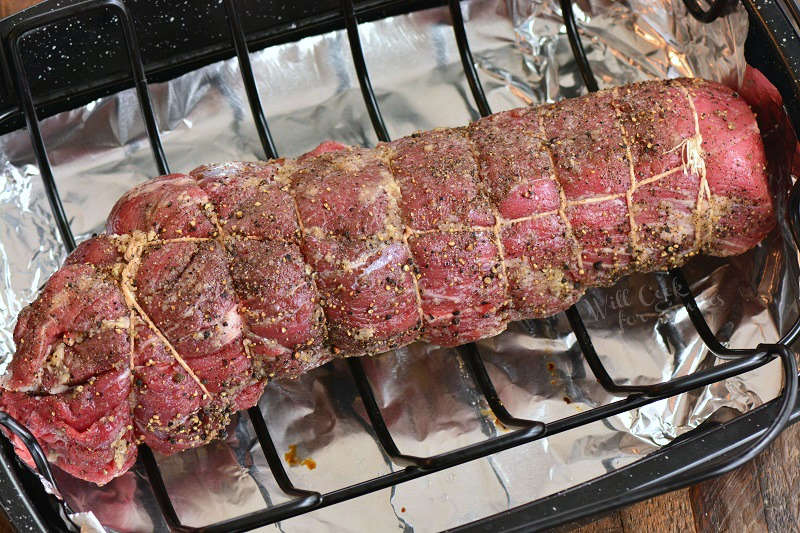
COOKING BEEF TENDERLOIN
Through my experience cooking beef tenderloin, I have two different sets of oven temperatures developed. When I cook the center cut of the tenderloin (chateaubriand), I cook it at high temperature of 425° until it reaches medium-rare. When cooking the whole tenderloin, I start at high temperature for about 15 minutes. Then, I lower the temperature and slowly cook it at 325° until medium-rare.
Beef tenderloin is a lean cut so it should be cooked to medium-rare or medium temperature at the most.
Preheat the oven to 425° and line the bottom of the roasting pan with aluminum foil. Place cleaned and tied beef tenderloin on a rack inside the roasting pan and insert a leave-in thermometer in the center of the meat. (If you don't have a leave-in thermometer, you will need to take the meat out of the oven to take the temperature.)
Place the roasting pan in the oven and cook for 15 minutes at high temperature. Turn the oven temperature down to 325° and cook until the internal temperature is at 130°-135° for medium-rare. (Cook to 135°-140° for medium or 120°-125° for rare.) Personally, I pull the beef out at 130° because it continues to cook while resting under the tent.
Take the beef out of the oven and place it on a large plate, on a cutting board. Place pieces of butter on top of the tenderloin, along the whole cut. Tent it with a sheet of aluminum foil and let it trest for about 20 minutes (30 for a large tenderloin.)
Take tenderloin off the plate (leave the buttery juices on the plate) and cut it against the grain. Place cut beef slices back in the plate with juices.
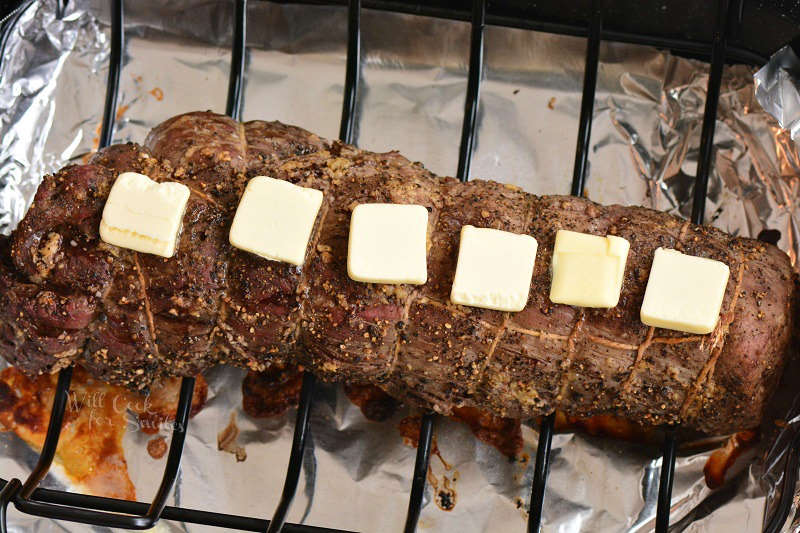
HOW TO REHEAT BEEF TENDERLOIN
To store the leftovers: place cooled beef tenderloin in an air-tight food storage container with a lid and keep it in the refrigerator for about 3 days.
To reheat beef tenderloin: preheat the oven to 350° and wrap each slice of beef tenderloin in aluminum foil. Don't wrap it too tight. Place wrapped tenderloin pieces directly onto the oven rack and reheat for 10-15 minutes. (Time will depend of thickness of cuts.) Reheat it just until warm in the middle so it doesn't overcook.
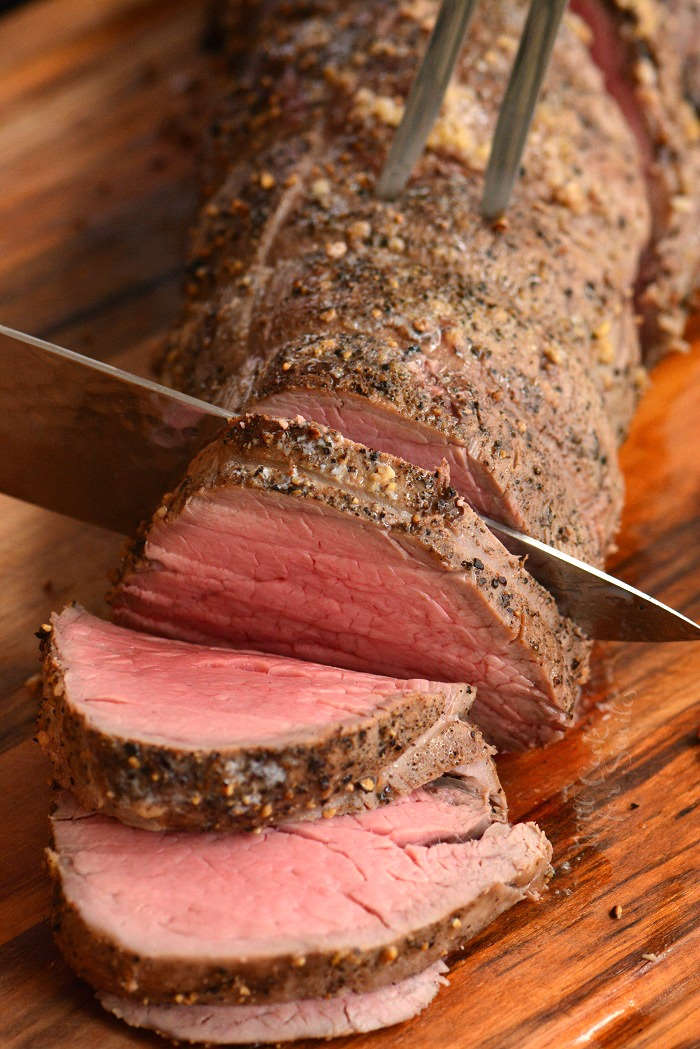
MORE BEEF RECIPES TO TRY:
Roast Beef
Prime Rib
How To Cook Steak In The Oven
French Onion Beef Brisket
How To Cook Filet Mignon
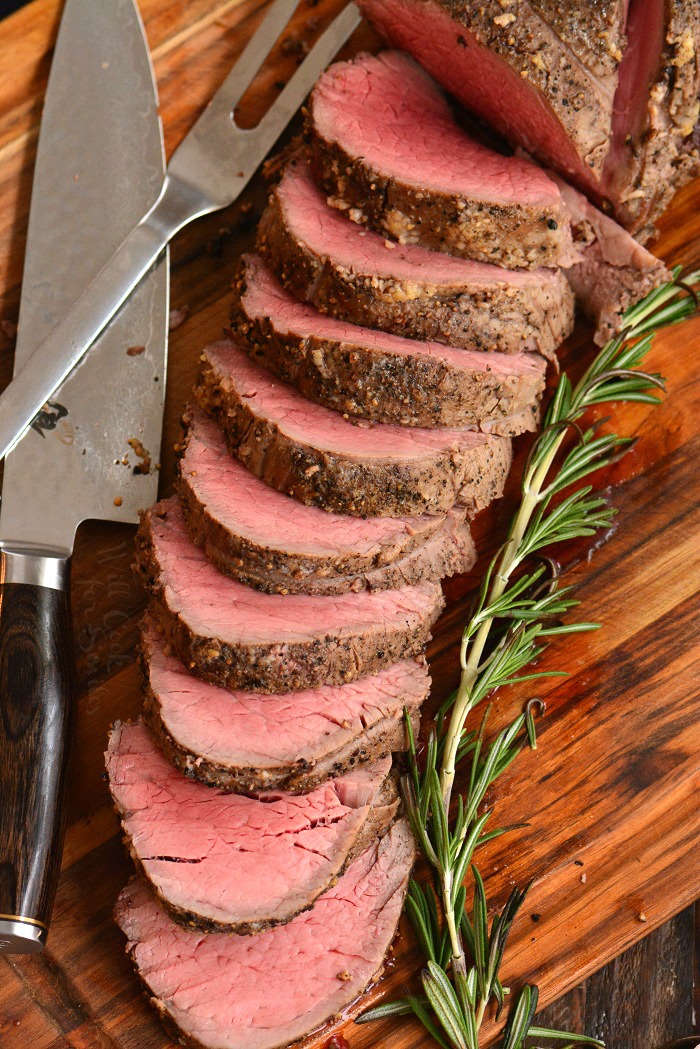
If you made any of my recipes and shared them on Instagram, make sure to tag me @willcookforsmiles and #willcookforsmiles so I can see all the things you tried!
Connect with Will Cook For Smiles!
Be sure to click below and follow me on my social media, so you never miss a recipe.
![]()
![]()
![]()
![]()
Don't forget to sign up for email, so you won't miss any new recipes.
PIN THIS RECIPE
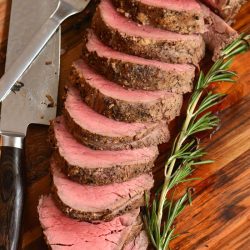
- 5 lb whole beef tenderloin trimmed
- 8 cloves of garlic pressed
- kosher salt
- freshly cracked black pepper
- 6-8 tbsp salted butter
Cleaning Beef Tenderloin:
-
NOTE: Most grocery stores with a butcher department can help you clean the tenderloin if you are not willing to do it yourself. You can also request a butcher to cut the tenderloin to a more desired size if needed.
-
CHAIN: Although most packaged tenderloin will come without the chain, some tenderloin may still have it attached. It looks like a thin, fatty piece of meat running down the length of the entire tenderloin.
It will be quite easy to spot and very easy to remove. You can actually remove it with your hands and may just been a few assist cuts along the way. Just follow it along, separating it from the tenderloin.
-
SILVERSKIN: Silverskin is a tough layer of white, shimmery connective tissue that runs along the tenderloin. It MUST be removed. To remove it, pull up some of the silver skin at one end of the tenderloin and then use a thin knife to cut along the silver skin to separate it from the meat.
Some silverskin will pull up just by tugging and pulling with your hands. use a knife to remove remaining pieces of silverskin but try not to remove any of the actual meat.
Tie and Season Beef Tenderloin:
-
To make the tenderloin more even thickness at the thin end, cut the tip where it starts to get narrowalmost all the way off butnot completely off. Tuck the narrow, thin tip under the tenderloin.
-
Use cooking twine to tie the tenderloin all along the whole length in 1-inch intervals. Make sure not to tie too tight where it starts cutting into meat.
-
Rub pressed garlic all over the tenderloin, on all the sides. Season generously with kosher salt and cracked pepper all over as well.
Cooking Beef Tenderloin:
-
Preheat the oven to 425° and line the bottom of the roasting pan with aluminum foil.
-
Place cleaned, tied, and seasoned beef tenderloin on a rack inside the roasting pan and insert a leave-in thermometer in the center of the meat. (If you don't have a leave-in thermometer, you will need to take the meat out of the oven to take the temperature.)
-
Place the roasting pan in the oven and cook for 15 minutes at high temperature.
-
Turn the oven temperature down to 325° and cook until the internal temperature is at 130°-135° for medium-rare. (Cook to 135°-140° for medium or 120°-125° for rare.) Personally, I pull the beef out at 135° because it continues to cook while resting under the tent.
-
Take the beef out of the oven and place it on a large plate, on a cutting board. Place pieces of butter on top of the tenderloin, along the whole cut.
-
Tent it with a sheet of aluminum foil and let it rest for about 20 minutes (30 for a larger tenderloin.)
-
Take tenderloin off the plate (leave the buttery juices on the plate) and cut it against the grain. Place cut beef slices back in the plate with juices and serve.
All images and text ©Lyubov Brooke for ©Will Cook For Smiles. Please do not use my images without prior permission. If using my posts in collections and features, please link back to this post for the recipe. Disclaimer: Nutrition information shown is not guaranteed to be 100% accurate as most ingredients and brands have a slight variation.
Calories: 574 kcal | Carbohydrates: 1 g | Protein: 35 g | Fat: 47 g | Saturated Fat: 21 g | Cholesterol: 147 mg | Sodium: 1306 mg | Potassium: 599 mg | Fiber: 1 g | Sugar: 1 g | Vitamin A: 182 IU | Vitamin C: 1 mg | Calcium: 24 mg | Iron: 5 mg
Mention @willcookforsmiles and tag #willcookforsmiles
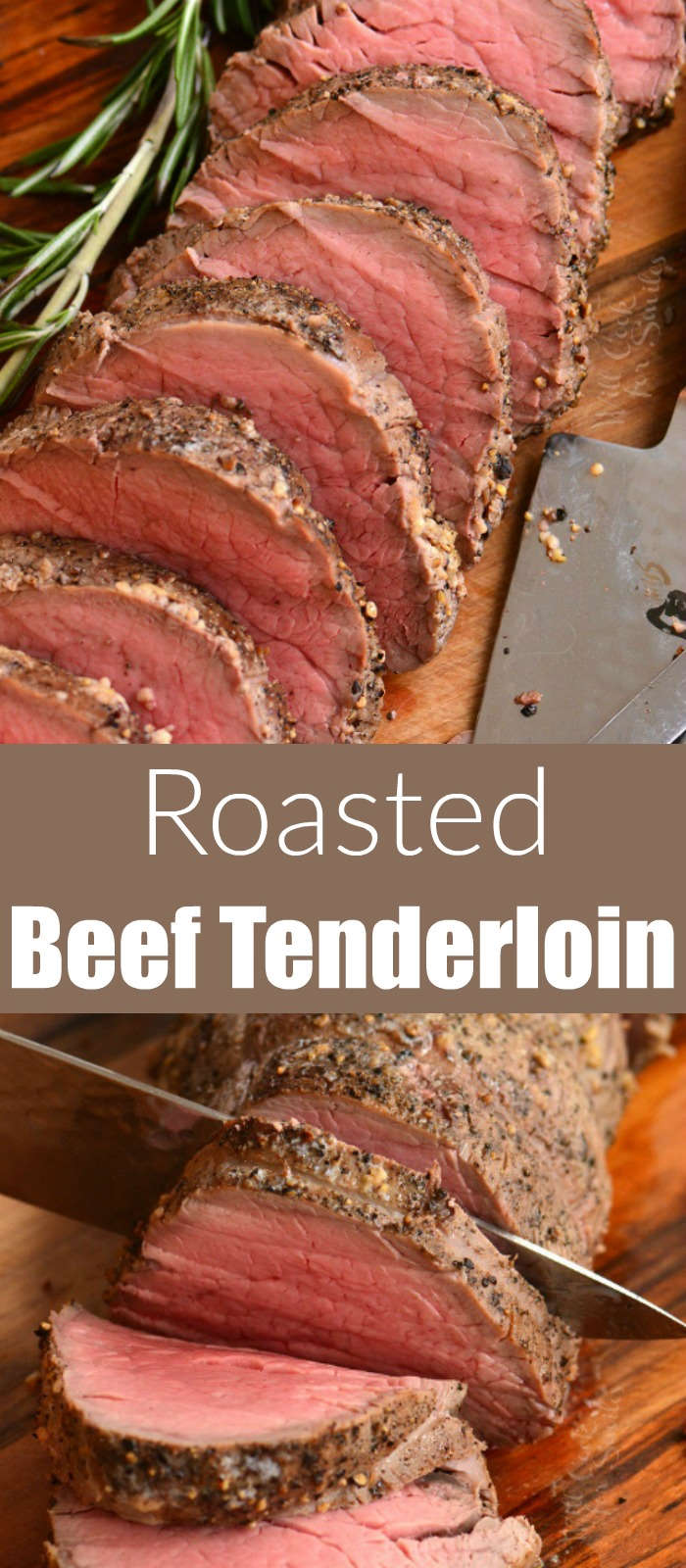
Source: https://www.willcookforsmiles.com/beef-tenderloin/#:~:text=To%20reheat%20beef%20tenderloin%3A%20preheat,depend%20of%20thickness%20of%20cuts.)
0 Response to "How Do You Reheat Beef Tenderloin"
Post a Comment